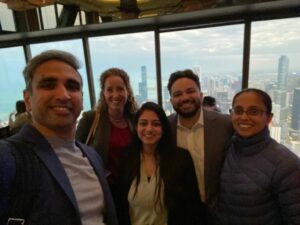Blog
HIMSS23 Highlights: Focus on Integration, Generative AI, and Increased Emphasis on Risk Mitigation

Artificial Intelligence (AI), technology integration, and consumerization are among the key trends driving the future of healthcare, a glimpse into the horizon at HIMSS23 showed. Read on to learn takeaways from Everest Group analysts who attended the recent global healthcare conference.
More than 35,000 healthcare leaders converged in Chicago last week to share ideas, highlight investments, showcase demos, and shape the future at HIMSS23. Technology integration, value realization, and risk avoidance dominated conversations at this year’s more strategic and connected conference focused on finding solutions to urgent issues.
Here are the three main themes we saw at HIMSS23:
- Integration is the key to realizing value
Integration was a major topic, as many organizations struggle to stitch together various composable platforms. While microservices have enabled precision and faster outcomes for specific use cases, these independent solutions often do not communicate with each other, which can hinder value realization. Many stakeholders we interacted with highlighted the desire to explore ways to better integrate these platforms.
- Generative AI is attracting attention
, and its potential applications is creating a lot of excitement. Major technology companies such as Microsoft and Google are leading the way in developing innovative uses for AI in healthcare, including creating new health applications. While some early examples of AI in healthcare show promise, such as voice dictation that help doctors document patient information more efficiently, how AI will address broader healthcare challenges such as staffing shortages, physician burnout, and rising costs remain to be seen.
- Consumerization of healthcare will continue to grow
Putting the patient at the center of healthcare was another recurring theme, with a focus on designing healthcare systems and technologies that are intuitive and seamless for users. The increased emphasis on user experience has been influenced by the consumer world, where these types of technologies are the norm. The coming years are likely to bring a greater focus on patient portals, wearable health solutions, and virtual care delivery technologies to improve patient/member experience.
How was HIMSS different this year?

The annual HIMSS conference returned to Chicago, with attendees noting a greater sense of urgency and action in meetings versus prior events in Orlando and Las Vegas. A large number of healthcare information and technology companies attending were focused on emerging enterprise priorities around value-based care (VBC) and interoperability.
Leaders engaged in meatier discussions focused on integration, value realization, and risk avoidance. The conversations showed that healthcare enterprises are looking for solutions to get more out of their technology, budgets, and resources in today’s challenging environment.
The large post-pandemic turnout demonstrated the appetite for in-person interaction. Event organizers focused on creating more focused opportunities for attendees to gather and have relaxed and candid conversations with friends, colleagues, and clients, which have been difficult to replicate virtually.
Overall, interacting with industry leaders influencing the next stage in healthcare technology at HIMSS23 was an illuminating experience for Everest Group analysts Abhishek Singh and Manu Aggarwal, who are available to share their insights.
Continue reading about the healthcare industry and the trends influencing decision-making by healthcare payers in our blog, The Recessionary Conundrum: What Lies Ahead for Healthcare Payers?